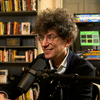Today we reunite with Seth Stephens-Davidowitz, the acclaimed author known for "Don't Trust Your Gut." Seth introduces his new book "Who Makes the NBA," a trailblazing work written in just 30 days using AI. He shares how AI tools, particularly ChatGPT's code interpreter, inspired him to blend his passion for basketball with data science, creating an innovative approach to sports analytics.
Seth dives into the fascinating insights from his book, addressing questions like the key factors for NBA success, the role of genetics versus training, and the impact of coaching on players' careers. The discussion also covers intriguing topics like the hypothetical best NBA player at a uniform height and the global distribution of NBA talent.
James and Seth further explore the business side, discussing strategies to monetize Seth's groundbreaking work. They brainstorm ideas for expanding the reach and impact of his AI-driven approach to sports analytics, offering insights into the potential of AI in both creative and commercial realms. This episode offers a unique blend of sports, data science, and business innovation, showcasing the transformative power of AI in modern industries.
-----------
What do YOU think of the show? Head to JamesAltucherShow.com/listeners and fill out a short survey that will help us better tailor the podcast to our audience!
Are you interested in getting direct answers from James about your question on a podcast? Go to JamesAltucherShow.com/AskAltucher and send in your questions to be answered on the air!
------------
Visit Notepd.com to read our idea lists & sign up to create your own!
My new book, Skip the Line, is out! Make sure you get a copy wherever books are sold!
Join the You Should Run for President 2.0 Facebook Group, where we discuss why you should run for President.
I write about all my podcasts! Check out the full post and learn what I learned at jamesaltucher.com/podcast.
------------
Thank you so much for listening! If you like this episode, please rate, review, and subscribe to “The James Altucher Show” wherever you get your podcasts:
Follow me on Social Media:
------------
- What do YOU think of the show? Head to JamesAltucherShow.com/listeners and fill out a short survey that will help us better tailor the podcast to our audience!
- Are you interested in getting direct answers from James about your question on a podcast? Go to JamesAltucherShow.com/AskAltucher and send in your questions to be answered on the air!
------------
- Visit Notepd.com to read our idea lists & sign up to create your own!
- My new book, Skip the Line, is out! Make sure you get a copy wherever books are sold!
- Join the You Should Run for President 2.0 Facebook Group, where we discuss why you should run for President.
- I write about all my podcasts! Check out the full post and learn what I learned at jamesaltuchershow.com
------------
Thank you so much for listening! If you like this episode, please rate, review, and subscribe to “The James Altucher Show” wherever you get your podcasts:
Follow me on social media:




